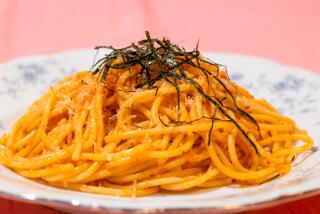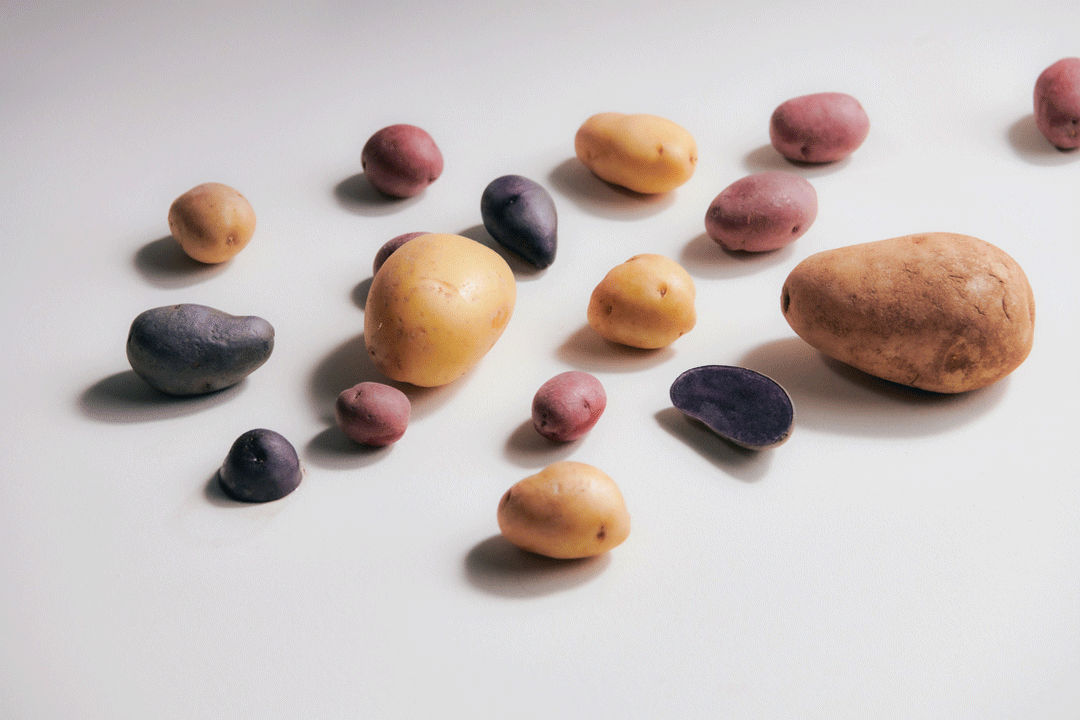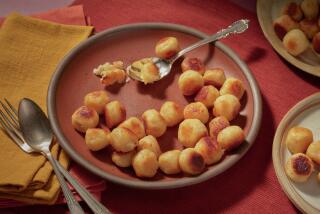Foods We Love : Potatoes I Have Known
- Share via
I love potatoes sliced thin and fried with onions and a little garlic. I love potatoes baked in an oven until they’re puffed and floury, then split and stuffed with butter and lots of black pepper. I love potatoes boiled or steamed until tender and tossed with butter and parsley. I love potatoes roasted with rosemary and whole garlic cloves.
I remember a potato pizza that was crisp on the top and bottom and meltingly soft in between. I remember boiled potatoes topped with creamy salt cod and flecked with white truffles. I remember potato salad made with crisp green beans and rich, egg-y black truffle mayonnaise.
But when I think of potatoes, the first thing that comes to mind is the potato sandwich Michel Richard makes every once in a while at Citrus restaurant. It’s not on the menu, but when the mood strikes him, here’s how it goes:
Start, of course, with potatoes--mashed, with an equal weight of butter. On top of this, put a healthy slice of foie gras , cooked suddenly over high heat so it’s just crisp on both sides and warm and buttery in the middle. On top, spread another layer of mashed potatoes. Run the whole thing under a broiler so the top sets with a slight crunch. Drizzle a thin ribbon of deeply reduced demi-glace around the outside. Serve at once with a well-made Burgundy of a decent vintage (preferably Domaine Dujac “Clos la Roche”), or perhaps a Banyuls, if you’re feeling daring.
The sound you hear is angels coming to transport you home. Oddly enough, though, it’s not the foie gras but the potato that is the star of this show. Of course, these are not your typical mashed potatoes, which can sometimes taste thin and gray and more like cooking water than potatoes. Silky, almost liquid, these are a Mozart sonata on a warm plate--the perfect marriage of the earthiness of potatoes and the heavenliness of butter.
This recipe has a rather tangled lineage. You won’t find anything like it in Escoffier, or in Larousse, Courtine, Careme, Pellaprat or any other English-language source I checked. Richard Olney, in “Simple French Food,” comes closest. He doesn’t include a recipe but loosely describes the procedure, though he says only to use a “generous quantity” of butter. Paul Bocuse is also close, though he calls for only just under 1/4 pound of butter per pound of potatoes. He does add a good tip: Dry the potato puree over low heat before adding the butter to make it lighter.
In the food community, many refer to these buttery mashed potatoes generically as “Robuchon’s mashed potatoes,” after the celebrated French chef. Yet in “Simply French,” Patricia Wells’ book on Robuchon’s food, the potatoes contain much less butter and are stabilized with cream. Did she “interpret” the dish? Did she dodge the real recipe for fear health-conscious Americans wouldn’t accept the original?
Richard says his inspiration comes from Ali Bab, the early 20th-Century French food writer, and that is where Robuchon must have gotten his as well. And, indeed, a recipe from the French version calls for equal weights potatoes and fresh butter (“ tres fin “). The peeled potatoes are salted, steamed, passed through a food mill and mixed “intimately” with the butter. Interestingly, the same recipe from an American edition calls for mixing boiled potatoes and butter (no amounts specified) and thinning with milk, though it does say that, properly made, these are truly worth the title “ pommes mousselines. “
Whatever, this is obviously not the kind of thing you can eat very frequently (I once said I loved them better than ice cream, and that the nutritional analyses were about the same). But for those times when nothing else will do, I have whipped up a home version. Be forewarned that this is still a lot of butter, though not as much as the original. This is what it takes. The first time I tried it, I stopped after beating in what seemed like a massive amount of butter--two full sticks. The potatoes lacked the silky quality of Richard’s, so I called him. “ Pas de beurre ,” he said sadly, and over the phone I thought I heard him shaking his head in dismay at my faintheartedness. Sure enough, I added another couple sticks and things were grand.
Since then, I’ve made these potatoes fairly often, changing them slightly almost every time. This is what one friend calls the diet version, since part of the butter is replaced by olive oil. I don’t think she’s serious.
Don’t feel obliged to use these potatoes only with shrimp. I also like them with grilled fish, lamb chops or roasted chicken or almost anything else you can name. Come to think of it, I don’t mind eating them straight out of the bowl, either.
In fact, I could eat these mashed potatoes with just about anything short of chocolate sauce. After all, we still have to have at least one reason for ice cream.
I like the idea of eating this dish with the heads still on the shrimp. It’s messy, but there is a lot of good, flavorful fat in the heads that will drip into the puree and mix in and make the potatoes even better. If this is a little too much for you, use head-off shrimp that have been peeled and deveined.
HERBAL MASHED POTATOES WITH GRILLED SHRIMP 3 pounds russet potatoes, peeled and cut into 1-inch pieces Boiling salted water 1 pound butter, room temperature and cut in pieces, but not too soft 1/4 cup extra-virgin olive oil 1/2 teaspoon finely minced garlic 1/4 teaspoon fresh thyme leaves 1/2 teaspoon finely minced fresh basil 2 tablespoons fresh whole basil leaves Salt, pepper Grilled Shrimp
Cook potatoes in boiling, salted water until easily pierced with knife (cube should smash easily between fingers). Remove from water and puree through potato ricer or food mill. Do not use food processor.
While still hot, place potatoes in large mixing bowl with 1/3 of butter and beat with wooden spoon until butter is incorporated. Repeat until all butter is used. Drizzle olive oil over top of potatoes and beat well. Add garlic, thyme, minced and whole basil leaves. Mix well and season to taste with salt and pepper. Do not overbeat or use food processor, or puree will take on rubbery texture.
Mound potato puree in center of each of 6 plates and place 3 Grilled Shrimp across top of each serving. Makes 6 servings.
Each serving contains about: 959 calories; 905 mg sodium; 338 mg cholesterol; 77 grams fat; 40 grams carbohydrates; 28 grams protein; 0.94 gram fiber.
Grilled Shrimp 1 1/2 pounds head-on shrimp (16 to 18 per pound size) 1/4 cup white wine 1 tablespoon finely minced garlic 2 tablespoons olive oil Salt, pepper
Place shrimp in medium-sized mixing bowl. Add white wine, garlic, olive oil, and salt and pepper to taste. Stir well to coat shrimp. Cover with plastic wrap and marinate at room temperature 15 minutes or refrigerate up to 1 hour.
When ready to cook, heat grill to very hot. Thread shrimp on skewers, 3 shrimp to each skewer. Cook shrimp on grill until color changes on 1 side, approximately 3 minutes. Turn over and continue cooking until color changes and shrimp is firm to touch, another 2 to 3 minutes.
More to Read
Eat your way across L.A.
Get our weekly Tasting Notes newsletter for reviews, news and more.
You may occasionally receive promotional content from the Los Angeles Times.











